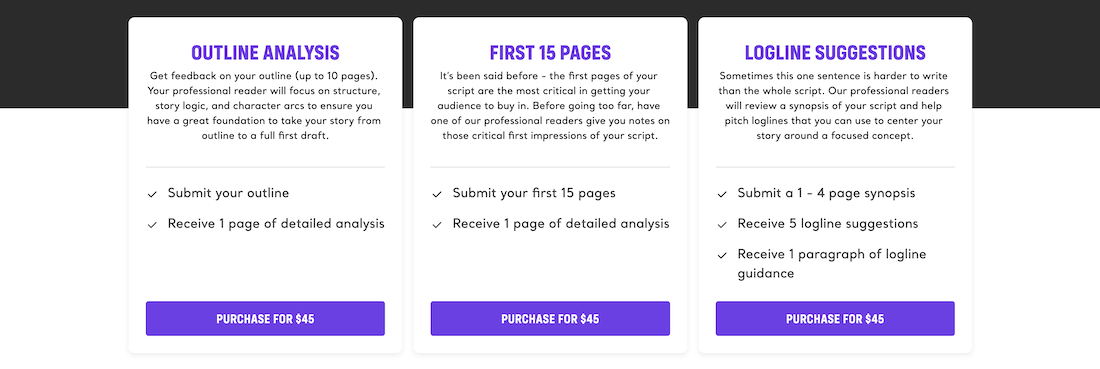What Are Open Writing Assignments?

One of the most misinterpreted opportunities that screenwriters will encounter is open writing assignments (OWAs). When we’re talking about OWAs, we’re not talking about contracted assignments or work-for-hire contracts. Studios, streamers, networks, and production companies provide a concept, and multiple writers pitch their versions in a process known as sweepstake pitching.
Let’s dive into the subject of OWAs so you can understand the industry expectations, the pros, and the cons.
What Are Open Writing Assignments?
An open writing assignment is essentially a job opening in the film or television industry where a studio, production company, or network seeks a screenwriter to develop a specific project.
Unlike spec scripts, where writers create their own original material in hopes of selling it, OWAs involve projects that are already in some stage of development. The script might be based on a pre-existing concept, book, comic, or an earlier screenplay that needs rewriting or polishing. A producer could also have an original concept that needs to be developed into a feature-length script.
Read More: Every Type of Screenwriting Contract Explained
The Origins of Open Writing Assignments
OWAs have been a part of the screenwriting world primarily in the 2000s—at least by definition. During the screenwriting boom of the 1980s and 1990s, studios informally used an early version of OWAs, bringing in screenwriters to brainstorm concepts. Sometimes those writers were hired. Sometimes they were not.
The official contracted OWAs was born during a time in the early 2000s when the industry became more and more risk-averse when it came to potential legality issues. In short, they didn’t want to be sued. So, instead of picking the brains of screenwriters during various meet-and-greet meetings, development executives and their lawyers made official contracts for these types of discussions.
Before the 1980s, movie studios were primarily owned by people, not corporations. The old studio system would have staff writers to handle various projects. Staff writers were screenwriters who were contracted by the studio as official staff. They would earn annual salaries, very similar to how studios had actors under contract to act in whatever the studio wanted them to be in.
As the industry evolved, the need for specialized writers for specific projects emerged, primarily in the 1980s and 1990s when the spec market of screenwriting was booming, allowing studios to hire some of the hottest writers in the business.
This eventually gave rise to the concept of OWAs, allowing studios and production companies to tap into the diverse pool of freelance screenwriting talent.
The Process of Open Writing Assignments
The process of securing an open writing assignment typically begins with a studio or production company identifying a project that requires a writer. It could be a brand-new idea, an adaptation of existing material, or a rewrite of a previous script. The next step involves finding the right writer for the job.
Let’s break down what happens.
Development Phase
The studio or production company outlines the project, including its genre, tone, target audience, and any specific requirements or vision they have. Producers, development executives, and sometimes contracted screenwriters hired to write treatments complete the preliminary work.
Agencies and Management Companies Receive OWAs
Agents and managers play a crucial role in matching writers with OWAs. They pitch their clients to studios and production companies, highlighting the writers' previous work, strengths, and suitability for the project.
Read More: How This Screenwriter Used Contest Feedback To Find His Future Representation
Meet and Greet Meetings
Once the studio or production company has a list of potential writers, they will conduct meetings to discuss the project in more detail. These meetings are a chance for each writer or writing team to showcase their understanding of the material, their creative vision, and how they can contribute to the project.
The Pitch
Editors ask writers to offer more official pitches about their take on the project, presenting story ideas, character arcs, and potential plot developments. A successful pitch demonstrates the writer’s grasp of the material and their ability to bring something unique to the table.
Read More: Ridley Scott Has a Simple Secret for Pitching to Hollywood
Assignment and Contract
If the studio or production company likes a writer’s pitch, they move forward with an assignment. This involves negotiating a contract, outlining the terms of the engagement, the scope of work, deadlines, and payment.
The Pros and Cons of Open Writing Assignments
For screenwriters, OWAs offer both benefits and challenges.
OWA Pros
- Networking Opportunities: Working on OWAs allows writers to build relationships with industry professionals, including producers, directors, and development executives. These connections can lead to future opportunities and collaborations.
- Diverse Experience: OWAs offer writers the chance to work on a variety of projects, from adaptations to original concepts. This diversity can help writers hone their craft and expand their creative horizons.
- Creative Collaboration: Working on OWAs involves close collaboration with other creative professionals. This can be a rewarding experience, allowing writers to learn from others and contribute to a collective vision. Film is a collaborative medium.
OWA Cons
- Creative Constraints: OWAs come with certain limitations, as writers must adhere to the project’s predefined parameters, which can sometimes stifle creativity, especially if the writer has a different vision for the material. But that’s the nature of all screenwriting gigs, so…
- Competition: Securing an OWA can be highly competitive, with numerous writers vying for the same assignment. Writers need to constantly prove their worth and stay ahead of the competition. Good isn’t good enough. Your pitch has to be amazing.
- Uncertainty: There’s no guarantee that the project will move forward to script. And if it doesn’t go to script, you’re not going to get hired.
- OWAs Don’t Pay: You aren't receiving payment for creating and presenting a pitch, including pitch materials like a synopsis, pitch deck, outline, and treatments. What you’re doing is fighting for the opportunity to be hired. In short, you’re competing for a job.
---
Open writing assignments represent a unique and valuable opportunity for screenwriters. They offer a chance to work on diverse projects, collaborate with industry professionals, and gain steady employment.
They also come with helpful challenges, teaching screenwriters how to balance creativity with practical constraints and navigate a competitive landscape. This is the nature of a screenwriting career.
Read More: 7 Ways Screenwriters Can Avoid Getting Ripped Off
Check out our Preparation Notes so you start your story off on the right track!

Ken Miyamoto has worked in the film industry for nearly two decades, most notably as a studio liaison for Sony Studios and then as a script reader and story analyst for Sony Pictures.
He has many studio meetings under his belt as a produced screenwriter, meeting with the likes of Sony, Dreamworks, Universal, Disney, Warner Brothers, as well as many production and management companies. He has had a previous development deal with Lionsgate, as well as multiple writing assignments, including the produced miniseries Blackout, starring Anne Heche, Sean Patrick Flanery, Billy Zane, James Brolin, Haylie Duff, Brian Bloom, Eric La Salle, and Bruce Boxleitner, the feature thriller Hunter’s Creed, and many Lifetime thrillers. Follow Ken on Twitter @KenMoviesand Instagram @KenMovies76
Get Our Screenwriting Newsletter!
Get weekly writing inspiration delivered to your inbox - including industry news, popular articles, and more!































